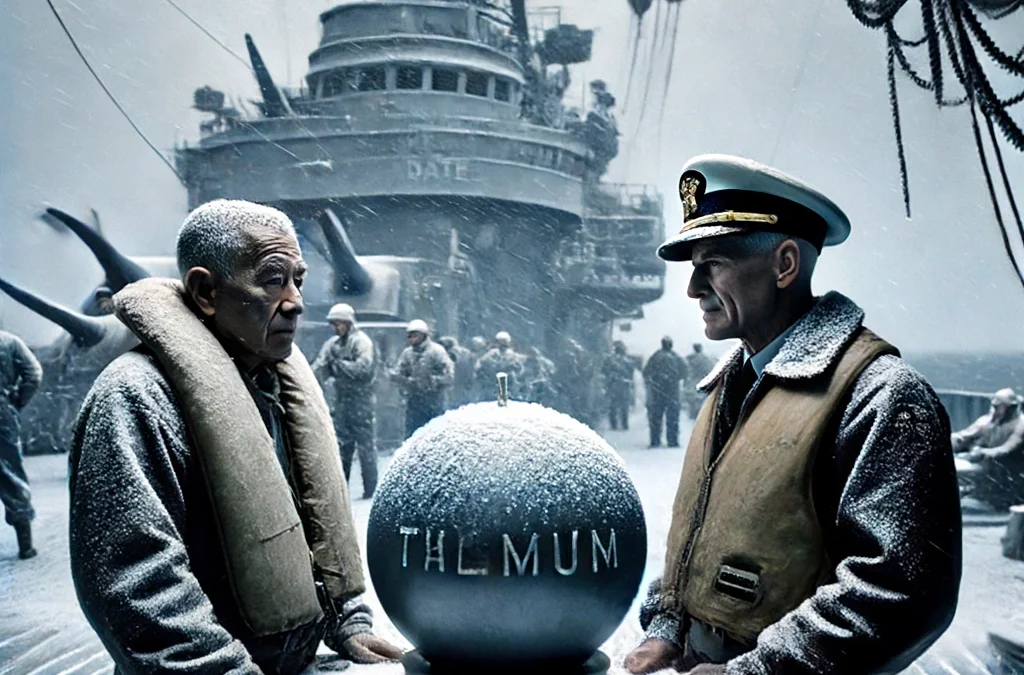CHAPTER 1
When the bomb exploded, U.S.S. Alaska, was steaming westward, under complete radio silence, somewhere near the international date-line on the Great Circle course south of the Aleutian Islands.
爆弾が爆発した時、アメリカ海軍太平洋艦隊に新しく加わった軽空母アラスカは、完全な無線封鎖の下、アリューシャン列島南部の大圏コースを西へ向かって航行していた。
It was either the second or the third of April, 1945, depending on whether the Alaska, the latest light carrier to be added to American naval forces in the Pacific, had passed the 180th meridian.
日付変更線を越えたかどうかにより、1945年4月2日か3日のいずれかだった。
I was in the carrier, in fact in the magazine, when the blast occurred and I am the only person who can tell how and why the Alaska disappeared without a trace in the Arctic waters west of Adak. I had been assigned by Navy Public Relations to observe and report on Operation Octopus—the plan to blow up the Jap naval base at Paramushiro in Kuriles with the Navy’s recently developed thorium bomb.
私は空母の、事実、弾薬庫にいた。そして、アラスカがアダック島の西の北極海で跡形もなく消えた方法と理由を語れるのは、私だけだ。私は海軍広報部から、オクトパス作戦、つまり海軍が最近開発したトリウム爆弾で千島列島のパラムシロにある日本海軍基地を爆破する計画を観察し、報告するよう命じられていた。
My name, by the way, is Frank Jacklin, Lieutenant-Commander, U.S.N.R. I had been commissioned shortly after Pearl Harbor, as a result of my vigorous editorial crusade on the Hartford (Conn.) Courant to Aid America by Defending the Allies. I was a life-long Republican and a personal friend of Frank Knox, so I had no trouble with Navy Intelligence in getting a reserve commission in the summer of 1940. (I never told them that I had voted for Roosevelt twice, so I was never subjected to the usual double-check by which the Navy kept its officer-corps purged of subversive taints and doubtful loyalties.) So I had a first-rate assignment, by the usual combination of boot-licking and “yessing” which marks a good P.R.O.
ちなみに私の名前はフランク・ジャックリン、アメリカ海軍予備役中佐だ。「連合国を守ることによってアメリカを援助せよ」というハートフォード(コネチカット州)クーラント紙での私の熱心な社説キャンペーンの結果、真珠湾攻撃の直後に任命された。私は生涯共和党員であり、フランク・ノックスの個人的な友人だったので、1940年夏に海軍予備役に任命されるのに苦労はなかった。(私は2回ルーズベルトに投票したことは決して彼らに言わなかったので、海軍が将校 corps を破壊的な汚点や疑わしい忠誠心から守るために通常行う二重チェックを受けることはなかった。)だから、私は、良いP.R.O.の特徴である、おべっか使いと「イエスマン」の通常の組み合わせによって、一流の任務を与えられた。
It was on the first night in Jap waters, after we had cleared the radius of the Naval Air Station at Adak, that Professor Chalmis asked me to accompany him to the magazine. He said that his orders were to make effective disclosure of the mechanics of the thorium bomb as soon as we were clear of the Aleutians. Incidentally, he, I and Alaska’s commander, Captain Horatio McAllister, U.S.N., were the only people aboard who knew the real nature of Operation Octopus. The others had been alerted, via latrine rumor, that we were engaged in a sneak-raid on Hokkaido.
アダックの海軍航空基地の半径をクリアした後、日本の海域に入った最初の夜、チャルミス教授は私に弾薬庫に同行するよう頼んだ。彼は、アリューシャン列島を離れたらすぐにトリウム爆弾の仕組みを効果的に開示するよう命令を受けていると言った。ちなみに、彼と私、そしてアラスカの艦長ホレイショ・マカリスター大佐だけが、オクトパス作戦の本当の性質を知っていた。他の人たちは、トイレの噂で、北海道への奇襲攻撃に従事しているという警告を受けていた。
The thorium bomb, Chalmis told me, had been developed by the Navy, parallel to other hitherto unsuccessful experiments conducted by the Army with uranium. The thorium bomb utilized atomic energy, on a rather low and inefficient basis by scientific standards, but was yet sufficiently explosive to destroy a whole city. He proposed to show me the bomb itself, so that I could describe its physical appearance, and to brief me on the mechanics of its detonation, leaving to the Navy scientists at Washington a fuller report on the whole subject of atomic weapons. He had passes, signed by Captain McAllister, to admit us to the magazine and proposed, after supper, that we go to examine his gadget.
チャルミスは、トリウム爆弾は、陸軍がウランで行ったこれまでの失敗した実験と並行して、海軍によって開発されたと私に語った。トリウム爆弾は、科学的基準ではかなり低く非効率的な方法で原子力エネルギーを利用したが、それでも都市全体を破壊するのに十分な爆発力を持っていた。彼は私に爆弾そのものを見せて、私がその物理的な外観を説明できるようにし、その爆発の仕組みについて簡単に説明することを提案した。原子兵器の全主題に関するより完全な報告はワシントンの海軍科学者に任せることにした。彼は、マカリスター大佐が署名した弾薬庫への入場許可証を持っていて、夕食後に彼の装置を調べに行くことを提案した。
It was cold as professional charity on the flight-deck, with sleet driving in from the northwest as the icy wind from Siberia hit the moist air of the Japanese Current. There was a nasty cross-sea and the Alaska was wallowing and pounding as she drove towards Paramushiro at a steady 30 knots.
飛行甲板は寒かった。シベリアからの氷のような風が日本の海流の湿った空気にぶつかり、北西からみぞれが吹き込んでいた。荒れた十字波があり、アラスカは30ノットの速度でパラムシロに向かって航行しながら、大きく揺れていた。
“You know, Jacklin,” said Chalmis, as the Marine sentry took our passes and admitted us to the magazine, “I don’t like this kind of thing.”
「ジャックリン、わかるかね」と、海兵隊の歩哨が私達の通行証を受け取り、私達を弾薬庫に入れた時、チャルミスは言った。「私はこういうのは好きじゃないんだ」。
“You mean this war?” I asked, noticing irrelevantly the way the electric light gleamed on his bald head.
「この戦争のことですか?」私は尋ねた。無関係なことだが、電灯の光が彼の禿頭に輝いているのが気になった。
“I mean this thorium bomb,” he replied. “I had most to do with developing it and now in a couple of days one of these nice tanned naval aviators at the mess will take off with it and drop it on Paramushiro from an altitude of 30,000 feet. The timer is set to work at an altitude of 500 feet and then two or three thousand human beings will cease to exist.”
「このトリウム爆弾のことだ」と彼は答えた。「私はこの爆弾の開発に最も深く関わってきた。そして今、数日後には、食堂にいる日焼けした海軍の飛行士の一人が、この爆弾を積んで3万フィートの高度からパラムシロに投下するんだ。時限装置は500フィートの高度で作動するように設定されており、その後、2、3千人の人間が存在しなくなる」。
“The Japs aren’t human,” I observed, quoting the Navy.
「日本人は人間じゃない」と私は海軍の言葉を引用して述べた。
Chalmis looked at me in a strange, staring way.
チャルミスは奇妙な、凝視するような目で私を見た。
“Thank you, Commander,” he said. “You have settled my problem. I was in doubt as to whether to complete this operation in the name of scientific inquiry, but now I see I have no choice. See this!” he continued.
「ありがとう、司令官」と彼は言った。「あなたは私の問題を解決してくれた。私は科学的探究の名の下にこの作戦を完遂すべきかどうか迷っていたが、今、私には選択の余地がないことがわかった。これを見てくれ!」と彼は続けた。
“This” was a spherical, finned object of aluminum about the size of a watermelon, resting on a gleaming chromium-steel cradle.
「これ」とは、スイカほどの大きさのアルミニウム製の球状のフィン付き物体で、光り輝くクロム鋼の台座の上に置かれていた。

